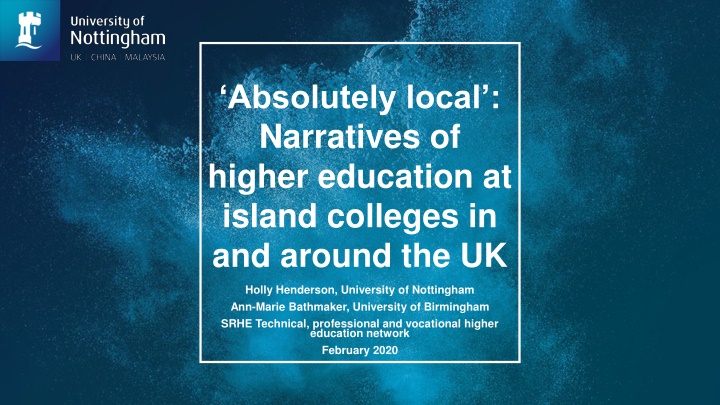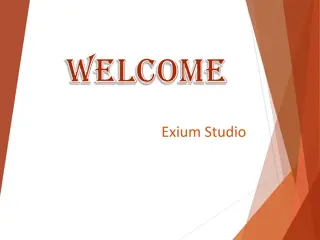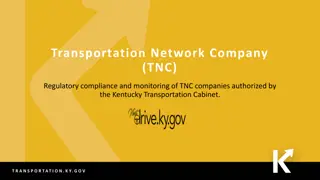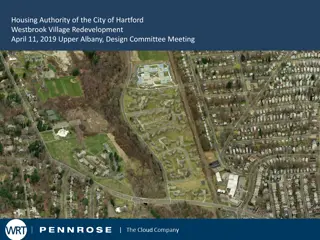
Exploring Island Higher Education Narratives and Geographies
Dive into the narratives and geographies of island higher education with a focus on mobility, place, and belonging. Uncover the challenges and opportunities faced by students and institutions in island colleges around the UK. Discover the impact of local versus global education, materialities, and the spatial stories of island-based higher education.
Download Presentation

Please find below an Image/Link to download the presentation.
The content on the website is provided AS IS for your information and personal use only. It may not be sold, licensed, or shared on other websites without obtaining consent from the author. If you encounter any issues during the download, it is possible that the publisher has removed the file from their server.
You are allowed to download the files provided on this website for personal or commercial use, subject to the condition that they are used lawfully. All files are the property of their respective owners.
The content on the website is provided AS IS for your information and personal use only. It may not be sold, licensed, or shared on other websites without obtaining consent from the author.
E N D
Presentation Transcript
Absolutely local: Narratives of higher education at island colleges in and around the UK Holly Henderson, University of Nottingham Ann-Marie Bathmaker, University of Birmingham SRHE Technical, professional and vocational higher education network February 2020
On every island All islands have a boundary, and you live your life within it, and you love it, or you break out and make a life elsewhere. On every island in the world, no matter how magnificent, there are those who cannot leave, and those who cannot stay. (Call the Midwife Christmas Special, 2019)
Presentation structure 1. Why look at island higher education? 2. Introduction to the project 3. Findings 1: Local or global higher education 4. Findings 2: Materialities and practicalities 5. Findings 3: Staying, leaving, and the spatial story of higher education 6. Conclusions
Why look at island higher education? Higher education for employability, social mobility or social justice? Global or local higher education? Virtual learning and the physical university Educational mobilities College-based, dual- sector or non- university higher education Education and the materiality of place Learning to leave: The irony of schooling in a coastal community (Corbett, 2007)
Why look at island higher education? Educational geographies: Mobility/immobility Mobility-privilege/immobility-disadvantage Education outside of urban centre Social geographies Place as concept Place and belonging Place and safety Rural, remote, coastal, island, urban places Islands and island-ness The island as metaphor The island as microcosm The island as contradiction The physicality of the island
Introduction to the project: Methodology Literature review: Educational geographies Islands and island- ness Social geographies 3 case colleges: Interviews with HE managers and tutors Interviews with students on two HE courses Participatory mapping as part of student interviews Narrative analysis of interview data: Findings presented today Documentary analysis: Policy documents Marketing documents
Introduction to the project Case study colleges: Located on islands ranging from around 60km2 to around 1,000km2 in size, and from around 20,000 to 90,000 in population. A range of relationships to the UK mainland, from crown dependencies to Scottish jurisdiction. Two independent colleges offering higher education through partnerships with UK universities. One member of the University of the Highlands and Islands. Each at different stages of developing or responding to policy shifts at island-specific, UK-based and global levels
The spatial story, local higher education and the island There is no spatiality that is not organized by the determination of frontiers. In this organization, the story plays a decisive role (de Certeau, 1984, p. 123) Leaving home to go to university is a deep-seated part of the English culture (Augar, 2019, p. 195)
Findings 1: Local or global higher education? On the island, we identified that there was a demand for cyber security skills and it was very difficult to get people here with those skills and so it was felt that a good way to do that would be to grow in- house as well so that we would actually have the course running here on the Island that would then seep out into the local community. So, if we become an awarding body in our own right we are going to have to bring in international students so, therefore the student experience would have to be more akin to an HEI in the UK albeit smaller. You know so again, it s what our unique selling points are which is the key thing. So do we put ourselves up in competition? Do we try and take students from the UK and bring them across? What can we offer from that perspective because our students don t have a fresher s week.
Findings 2: Materialities and practicalities For students and families: Tuition fees Living costs Travel costs Travel disruption And actually finding the university that people don t always leave because certainly our students are kind of trapped there. So I know some students that have gone across to Lancaster but actually a lot of Lancaster students leave at the weekends. For institutions: Partnerships with mainland universities Inter-island networks Degrees of remoteness
Findings 2: Materialities and practicalities Financial security Off-island social connections A clearly imagined educational or career future A particular world view Social confidence A lot of people whose children go to university from here have contacts in the UK or even if they go abroad somewhere else, so there s somebody. Whereas a young person who is absolutely local, who is from a certain financial income, won t have those mechanisms. Some of the less well-off students families, they have probably never been off the island. They may have been to one of the nearby islands if they re lucky. So their world view is completely different to what you would assume and that changes everything. It is down to the individual student and so some of them will be smart and gregarious and that s always where they see their future and that s the right thing Corbett, 2007 mobility capital
Findings 3: Staying, leaving and the spatial story of higher education Ties to locality Practical in multiple unpredictable ways Not always stories of limit or lack Challenge the spatial language of higher education I m happy to go travelling butI like the island. Everything that I want to do is on the island: I ve got my car; I ve got my family; I ve got my job potentially. I ve got my job that I do now, my fitness, everything. I can fit in everything that I want to do. It s just been really quiet, and I ve had my own space; when I think of my friends away at Uni, a lot of them are at art colleges down south. It s very crushed up and very busy there, and it s just a city. I don t really respond to that. I like peace and quiet. I quite like that I ve been in the same room all the time. So my whole journey s been in this room Holdsworth, 2009; Holton, 2016
Findings 3: Staying, leaving and the spatial story of higher education There s nothing to do up north. And if you get someone from the north, they ll probably tell you the same thing, there s nothing to do in the south. Various insults will be exchanged between the north and south. At 18, you re not necessarily ready to go and do that, there s a lot of people that aren t, there are people that will, in the UK, opt to go to a university that is down the road, so they can still live at home, for instance. That wasn t an option here at all, so all of a sudden, the only option is stay here or jump, literally jump and I think that s quite a big decision to make, for a lot of them, at that age. At one point I thought if I did my Master s I could go away, and my husband from Glasgow said, Well, we could go for a year if you want . He d get a job, so it s not completely out. I could do it now definitely more than I could have done when I was younger. Maybe it s giving you that bit more confidence. Finn and Holton, 2019; Donnelly and Gamsu, 2018
Conclusions Island locations show that: Institutional associations between student mobility and progression are pervasive and powerful There are place-specific barriers to higher education within and around the UK that are not widely known or discussed beyond the places themselves Normative patterns of higher education mobility are only one way of seeing the journeys, times and spaces of higher education The spatial story offers a way of challenging the deficit approach to staying local for higher education.
References Brooks, R. (2018). "Higher education mobilities: a cross-national European comparison." Geoforum 93: 87-96. Ceccato, V. A. (2015). Rural crime and community safety. Abingdon. Routledge. Corbett, M. J. (2007). Learning to leave : the irony of schooling in a coastal community. Nova Scotia, Fernwood Publishing. Donnelly, M. and S. Gamsu (2018). "Regional structures of feeling? A spatially and socially differentiated analysis of UK student im/mobility." British Journal of Sociology of Education: 1-21. Holdsworth, C. (2009). " Going Away to Uni : Mobility, Modernity, and Independence of English Higher Education students." Environment and Planning A 41(8): 1849-1864. Holton, M. (2015). " I Already Know the City, I Don't Have to Explore it : Adjustments to Sense of Place for Local UK University Students." Population, Space and Place 21(8): 820-831. Finn, K. and M. Holton (2019). Everyday Mobile Belonging: Theorising Higher Education Student Mobilities. London. Bloomsbury Valentine, Gill. "A safe place to grow up? Parenting, perceptions of children's













